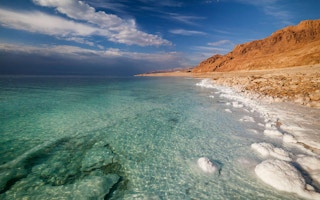Israel, Jordan and the Palestinians signed a memorandum of understanding today that outlines regional water-sharing initiatives from the Red Sea to Dead Sea to relieve shortages in the arid lands, the World Bank said.
The agreement includes an 180-kilometer (112-mile) pipeline northward from Jordan’s Red Sea port of Aqaba to the Dead Sea to channel 100 million cubic meters of water a year. The pipeline will cost $300 million to $400 million, Israel Regional Development Minister Silvan Shalom said in a statement.
The projects feature the development of a desalination plant in Aqaba that will produce water to be shared with Israel, increased water quotas to Jordan from Israel’s Sea of Galilee and the sale of waters made potable and salt-free from Israel to the Palestinians, the bank said.
The understanding is an outcome of talks between Israel, Jordan and the Palestinian Authority that took place as part of a larger, more ambitious Red Sea-Dead Sea Water Conveyance Study Program that’s been overseen by the World Bank.
That study examined various plans to halt the shrinking of the Dead Sea, whose restorative powers have attracted visitors since biblical times. The lowest place on Earth has lost a third of its surface area from drought, agricultural diversion and pumping to extract minerals for fertilizers.
“This is a breakthrough after years of difficulty and struggle,” Shalom said on Army Radio of a pipeline he estimated will take three years to build to the benefit of each side economically and environmentally.
Brine issue
The World Bank said as part of today’s accord that the brine by-product from desalination would be piped to the already-salty Dead Sea as a pilot test for the conduit plan. The bank in January said it was feasible to build a pipeline from the Red Sea to save the Dead Sea at a cost of $10 billion.
“The big step forward is that after many years of talking, this is a real agreement to do something on the ground” involving trilateral cooperation, said Dan Catarivas, director of the foreign trade and international relations division at the Manufacturers Association of Israel.
Preliminary reports from the Red Sea-Dead Sea Water Conveyance Study Program showed mixing sea water, concentrated desalination brine or both with Dead Sea water entailed risks, especially when in excess of 400 million cubic meters a year.
“The transfer of brine from the desalination plant proposed from Aqaba to the Dead Sea renders this project not feasible for the same reasons noted in the World Bank studies,” said Gidon Bromberg, Israeli director of EcoPeace/Friends of Earth Middle East.
Environmental study
The group instead called for an environmental study on the possibility of drying or evaporating the brine in the desert or releasing it back to the Red Sea.
The water-sharing memorandum, which demands technical work and studies before being undertaken, is “a new initiative arising from the Study Program,” the World Bank said. “However, it is not the same as the proposed Red Sea-Dead Sea Water Conveyance.”
This plan would include the sale of up to 30 million cubic meters a year of desalinated water from the Israeli utility Mekorot Water Co. to the Palestinian Water Authority for use in the West Bank, according to Shalom.
The understanding between the three sides in a signing today at the World Bank’s Washington headquarters comes as U.S. Secretary of State John Kerry approaches the halfway mark in his nine-month timetable for a Israel-Palestinian peace deal.
“Cooperation between neighboring countries is beneficial not just for all sides concerned but for a future of peace and reconciliation in the Middle East,” Foreign Ministry spokesman Yigal Palmor said.








